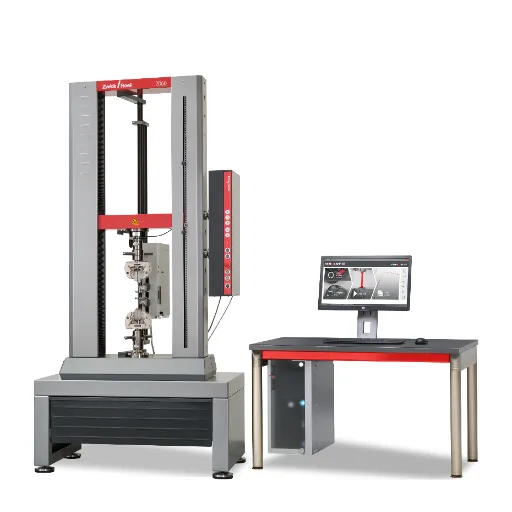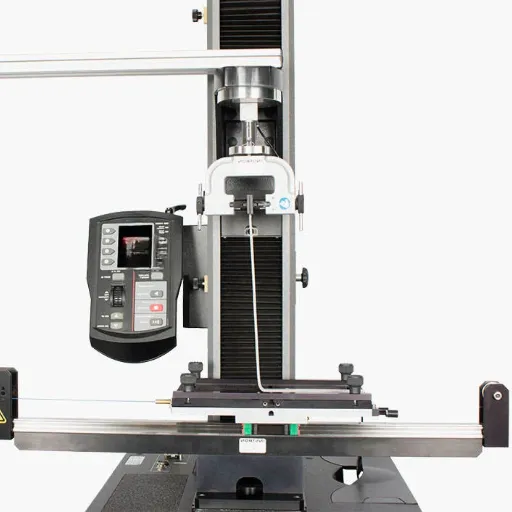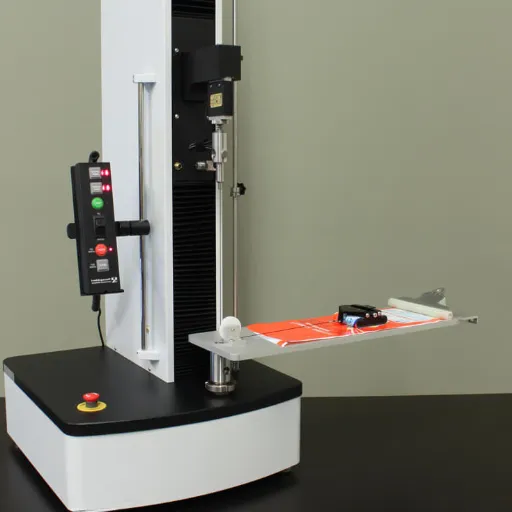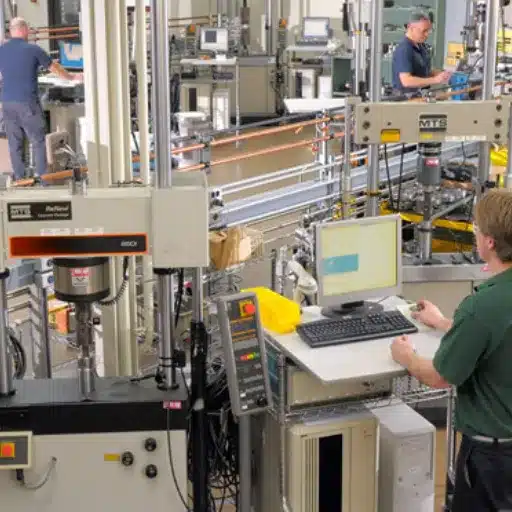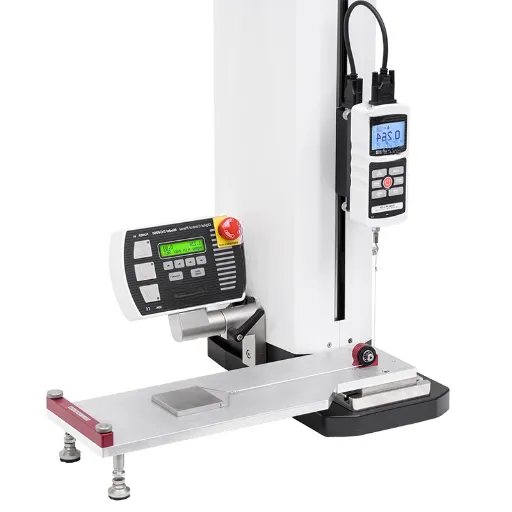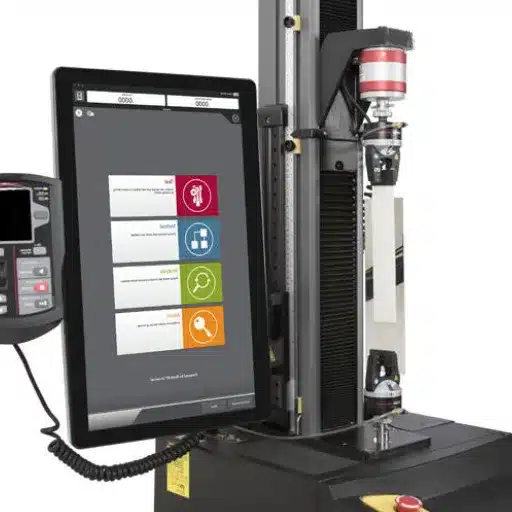With regard to understanding the physical properties of materials, tensile testing tends to be so fundamental across innumerable industries. At the heart of the testing lies the tensile test machine, an instrument essential for conducting strength, elasticity, and performance testing under tension on any material. These test machines must ensure accuracy and versatility to meet the stringent needs of either working on a new material or working on industry standards. This blog article presents you with a complete guide on tensile test machines, including their working method, applications, and advantages. You will come to know that universal tensile test machines tremendously catered to the physical testing of materials by way of accommodating materials of various types-from metals and polymers to textiles and composites. If you are interested in enhancing material analysis with more efficiency and reliability, then this article will help you gather insights to witness the full utilization of tensile testing technology.
Introduction to Tensile Testing Machines
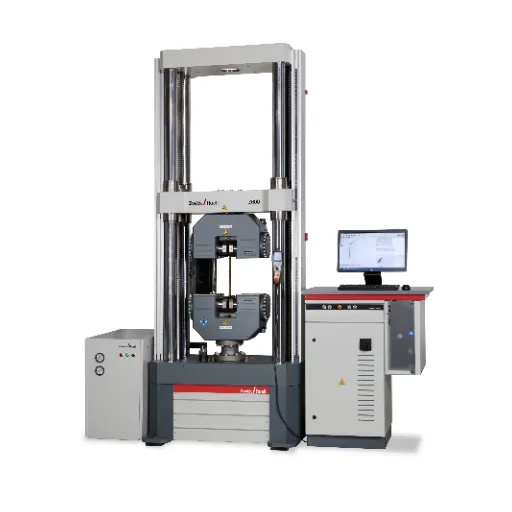
What is a Tensile Test Machine?
A tensile testing machine, often referred to as a Universal Testing Machine (UTM), is a testing apparatus that applies tensile loading in order to ascertain the mechanical properties of the material. To describe it in simpler terms, the testing machines exert a force on a material sample and measure the specimen’s response to this force until the specimen finally breaks. The process obtains valuable information pertaining to the strength, elasticity, ductility, and other physical properties of a material.
The main constituent of the machine will be a rigid frame holding load cells to measure force, grips for holding the material, and a crosshead to move and apply tensile force. The test specimen would be clamped down between these grips, and the machine would gradually increase the force with accompanying data recording for stress, strain, and deformation. The data garnered is absolutely essential to fully appreciate the behavior of the material under applied strain, as well as consider how it will perform in a practical real application.
Tensile test machines hold a place of importance in ensuring the quality of products in industries, including research and development. They are most common for testing metals, polymers, textiles, and composites to assess whether the materials conform to agreed-upon standards and design specifications. From these data obtained from tensile testing, the engineers and manufacturers are then able to analyze material selection, product design, and material reliability.
Purpose and Importance of Tensile Testing
Tensile testing is one of the most basic experiments performed for establishing strength and behavior of materials in tension. Application of a force in a controlled fashion by the tensile testing machines to the specimen gives crucial data for measuring mechanical properties of a material such as tensile strength, elongation, and yield point. Such properties are used to assess whether a material can be used in a particular application or environment.
Tensile testing is mainly for ensuring the quality and reliability of products. Industries such as construction, aerospace, and manufacturing depend on the material’s mechanical properties that indicate performance and likely failure. Using tensile test results, an engineer can further decide on material selection so that the intended functionality, safety, and performance criteria are fulfilled.
Tensile testing also has a vital position in research and development. Materials undergoing deformation and failure under stress are studied to promote the idea of stronger, lighter, and more efficient materials for the considered applications. This testing can help in improving existing products and is paramount for introducing better technologies and complying with regulatory standards.
Overview of Universal Testing Machines (UTM)
Universal Testing Machines are highly versatile instruments that test the mechanical properties of materials. The primary function is to apply a controlled tension or compression to the material sample to determine parameter strength, elasticity, and deformation. These machines find applications in the domains of civil engineering, automobile industries, aerospace, and manufacturing, to ensure that the materials comply with specification and desired performance standards.
A UTM will typically consist of a loading frame, a load cell, and an actuator for applying force. The sample being tested is secured between grips or fixtures, and a tensile or compressive force is exerted on it by the machine at a predetermined speed. The base of testing for the machine comprises an array of parameter recording such as load, elongation, displacement, stress-strain behavior of the material while performing tests. This important data determines material strength, ductility, and mode of failure.
The tensile testing machine is a very vital machine in quality control, research, and material innovations. Knowing the limits of performance of materials, redesigning products, choosing appropriate materials for use, safety considerations, and international standards become easier for companies to accomplish. The remarkable ability of the Universal Testing Machines to perform so many tests-Tensile, Compression, Bending and so on-makes the equipment a very valuable tool in both academic and industrial applications. The Universal Testing Machines thus play a leading role in the advancement of engineering and material science.
How Tensile Testing Machines Work
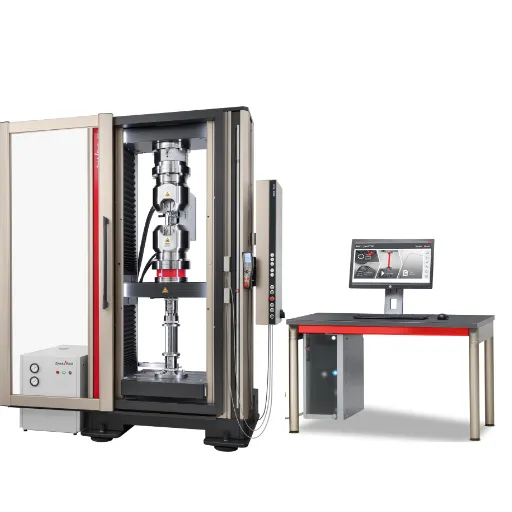
Mechanics of the Tensile Test
The axial load is applied on a material sample by tensile testing machines to determine its mechanical properties, such as tensile strength, elasticity, and elongation. At first, the test specimen is securely mounted between two grips or fixtures-one fixed and the other rigidly joined to a moving crosshead. The machine applies load gradually while the crosshead is moved at a predetermined rate, thereby extending the material under test and recording elongation.
During the test, the force applied and the deformation of the material were measured. The plot derived from these readings is called the stress-strain curve, which constitutes an important output used in determining material behavior under stress. The primary points of analysis on the curve are the elastic limit, yield level, ultimate tensile strength, and failure or fracture point of the material. These points account for a material’s working behavior under load and define its ability to be used in different applications.
The tensile testing machines are maintained to give one set of test results with certainty by following stringent standards such as ASTM or ISO guidelines. This makes the test results reliable, and the outcome can be satisfactorily compared across industries and research institutions. The most simple and effective testing procedure makes tensile testing a primary evaluation tool for material characterization, quality control, and innovation in material science, engineering, and related areas.
Components of a Tensile Testing System
The tensile testing system comprises key components that work in tandem to evaluate the mechanical properties of materials. These include the load frame, load cell, grips, and extensometer. Each component performs an essential function that contributes to the achievement of accurate and reliable results.
Key Components:
- Load Frame: The structural backbone that holds the specimen and applies controlled force
- Load Cell: Measures the level of force applied with utmost accuracy
- Grips: Hold the specimen in place during testing to prevent slipping
- Extensometer: Measures deformation or strain during tensile force application
Together, these components facilitate a full examination of a material’s tensile capabilities, including strength, elasticity, and breaking point, thus making the tensile testing system an indispensable tool in material testing and development.
Testing Procedures and Protocols
Testing Process Steps:
- Prepare specimen to standardized dimensions per testing guidelines
- Mount specimen between machine jaws ensuring firm grip without slipping
- Calibrate equipment for measurement accuracy
- Set specific parameters based on material (speed, load application rates)
- Apply tensile forces at controlled, predetermined rate
- Record real-time data on stress, strain, and ultimate strength
- Continue testing until specimen fracture point
- Analyze data to determine material properties
During testing, forces of tension would be applied on the specimen, usually at a well-controlled and predetermined rate, while its response to stresses is observed. The extensometer records the amount of elongation of the specimen as the tensile force increases. Stress, strain, and ultimate strength data are recorded in real time, measuring and tracking growing behavior along with the material up to the point of fracture. Such systematic recording of the data allows for very thorough test results and evaluation confirming to industry standards.
When testing is completed, the whole data is scrutinized to determine the properties of the materials that have been verged upon-the tensile strength, elasticity, yield point, and elongation-at-break. Any abnormalities within the results are thus considered, trying to decide whether they resulted from material inconsistencies, equipment misalignment, or errors in the experimental setup. Finally, results that speak highly for the performance and relevance of the material in science and engineering foster further collaboration and unprecedented development.
Choosing a Reliable Tensile Tester Manufacturer
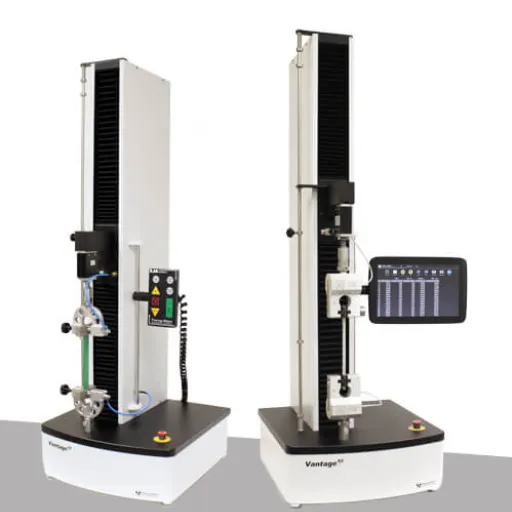
Impact of Quality and Accuracy on Testing Outcomes
The testing machine determines the strength and accuracy of the tensile force, which is of utmost importance to obtain reliable and reproducible results. A high-quality machine makes possible the accurate determination of tensile strength, elasticity, and elongation properties of materials. Accuracy is significant because minimum variations can lead to false conclusions in regard to the behavior of a material, that affect its consideration in engineering and design. Reliability minimizes the occurrence of errors and guarantees repeatability of test results, giving assurance to the results of the tests.
Likewise, tensile testing accuracy is critical not only to material characterization but also to the conformity of standards. Many industries handle very strict criteria to certify that materials conform to safety and durability requirements. Certified accuracy of machines assures businesses that their products would satisfy these standards, thereby minimizing the failure and enhancing the reputation on a very competitive market.
By supporting the acquisition of a reliable tensile testing device, companies provide for savings in later years as well. With better manufacturing and state-of-the-art instrumentation, such testing machines require very little maintenance and seldom need servicing. These machines are also very effective in reducing wastage of an activity, like defective raw materials, which contribute towards effectivity and sustainability of operations. Hence, the choice of a very dependable tensile testing machine for every laboratory would be the key to true results, compliance, and successful existence on a long-term basis.
Durability and Maintenance Considerations
In selecting a tensile testing machine, durability, and maintenance are prioritizing factors. That means a durable machine operates reliably for a long time, lessening periodic replacements. Machines built with top-grade materials, such as reinforced steels or solid alloys, are more resilient and resist violence during harsh testing environments. This very ruggedness ensures longer-term savings and unceasing productivity.
Essential Maintenance Tasks:
- Regular cleaning after use
- Inspection for loose nuts or bolts
- Lubrication of moving parts
- Periodic calibration verification
- Self-diagnostic system checks
It is a wise investment to have a machine with ease of maintenance. Many modern tensile testing machines are provided with simple maintenance facilities where parts are easily accessible, and systems for self-diagnostic checks are in place. Such facilities foster easy maintenance by operators who are not at all required to carry any higher technical skills. A laboratory can secure the machine to remain an asset for the final precision in tests and consistent outcomes if it puts importance on durability along with very good maintenance habits.
Comparative Analysis of Top Manufacturers
| Comparison Factors | High-End Manufacturers | Standard Manufacturers |
|---|---|---|
| Precision & Accuracy | Exceptional | Good |
| Durability | Long-term reliability | Moderate lifespan |
| User Interface | Advanced features | User-friendly design |
| Support Services | Comprehensive | Basic support |
| Material Range | Diverse applications | Specialized focus |
When the operational ability of the tensile testing machine has to be assessed, one should consider factors such as durability, accuracy, and ease of use and support services. Industry leaders usually produce machines inhouse that maintain strict control over precision and produce reproducible results, which are important for quality control in various industries. These machines are usually constructed to allow long periods of intermittent use and are fitted with the latest measurement technologies in order to give reliable performance, which is indispensable in materials testing.
Another important consideration is the breadth of testing applications that are subjected. Some are capable of producing tensile testing machines for materials as diverse as metals, polymers, textiles, and composites. Another class specializes in limited materials or niche applications and offers solutions fine-tuned to certain industries. Should the testing problem require a tensile testing machine, budgetary allowance would certainly be affected so will also the chance of scaling up in the near future. A good comparison of these factors will assure a good investment in a tensile testing machine.
Key Features of a High-Quality Tensile Testing Machine
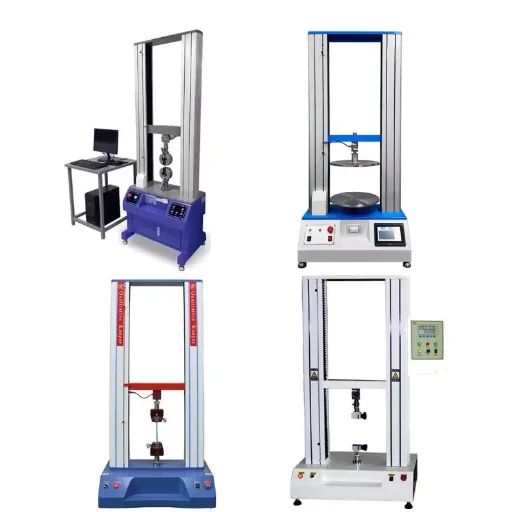
Load Capacity and Speed Range
Load capacity is quite important when selecting a tensile testing machine to ensure it can handle the various ranges of forces needed by your specific testing applications. In terms of their ranges, load-capacities largely differ, usually from a few newtons to several hundred kilonewtons, depending upon the nature of the material tested, or application. A machine with a capacity that even exceeds your current requirements will be versatile for future testing of materials that have greater strength or load, thereby enhancing the usability of the testing machine over a long period of time.
Load Capacity Range
Few Newtons to Several Hundred Kilonewtons
Speed Control
Adjustable for Material Requirements
Second to load, speed range is of importance since it sets the rate of testing. A wider range and one that can be adjusted will allow for the diversity of material behaviors and testing codes. Lower speeds are required when testing materials that deform slowly, whereas higher speeds are used for dynamic tests. Accurate speed control enables reliability and consistency of test results.
An ideal tensile testing machine will combine load capacity with speed range appropriate for all industry standards and for specific test requirements. They sell better when they have load cells that accommodate varying forces and speeds that can be turned up or down accordingly. Considering these factors based on your operational needs will not only ensure accurate results but also maximize the return on investment in your testing equipment.
Precision and Testing Software Integration
Accuracy is one of the most critical elements for ensuring that a tensile testing machine renders its tests correctly. The tensile testing machines must yield measurements accurate in their consistency to avoid unfit test outputs. High precision load cells and sensors detect the slightest fluctuations in transmitting force or elongation. Hence, users can analyze the mechanical behavior of materials confidently and make decisions based on dependable data.
Modern Software Features:
- Intuitive user interface
- Flexible test parameters
- Data visualization and reporting utilities
- Real-time monitoring capabilities
- Industry standard compliance protocols
All: A precision machine with intelligent software performance caters to the needs from construction to aerospace. This allows the testing system to always remain adaptable to changing standards while being true to measurements. Procuring machines built on strong precision with software capability assures superior performance, helping an industry meeting consistent quality and conformity to specifications.
Safety Features and Compliance Standards
Essential Safety Features
- Emergency stop buttons
- Protective guards and sensors
- Overload detection systems
- Automatic operation halt capabilities
- Real-time safety monitoring
Safety is paramount when working with tensile testing machines. To protect the operator, the machine is equipped with emergency stop buttons, guards, sensors that work to detect any overload, and other mechanical and electrical systems intended to protect the machine or the user from harm. Some advanced fail-safes are integrated into contemporary systems if anything unusual is detected, immediately halting operations and thereby creating a very safe environment for testing.
Tensile testing machines are an important aspect regulated according to international standards such as ASTM and ISO. Such standards ensure reliable, reproducible, universally accepted results. The testing methods and the final report are then given according to these guidelines to make it possible for industries to satisfy regulatory requirements along with quality assurance.
Tips for Selecting the Best Supplier
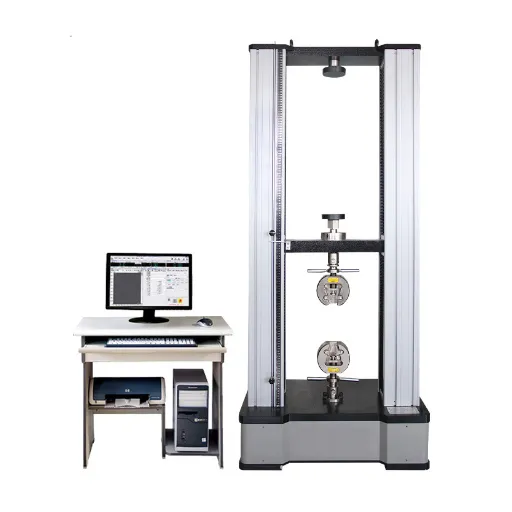
Budget Considerations and Cost-Effectiveness
It is essential to balance the budget and the functionality required once you are in the process of choosing your tensile testing machine. First of all, specify the key testing requirements and consider those machines that do the job without additional bells and whistles. Machines offering custom options may also be beneficial from a flexibility standpoint in the event that operational functions need to be scaled up or down with changing needs. This approach is cost-effective without compromising on the overall efficiency.
Total Cost of Ownership Factors:
- Initial purchase price
- Maintenance expenses
- Software updates and licensing
- Calibration services
- Operator training costs
- Installation and setup expenses
Beyond simply the purchase price, of course, one must consider installation and other indirect costs and the time commitment required by staff. Any problems with installation can have a ripple effect on project planning and end results. How much does the setup itself disrupt your service procedures? Also, consider whether the tensile testing machine needs to interface with equipment or workflows in your facility. One that seamlessly fits into your current setup can be worth its weight in gold when considering time saved otherwise spent on extensive modifications. An optimal balance between affordability and quality is critical from a value-for-money perspective, while the tensile testing machine has to meet performance standards through which your specific requirements are judged.
After-Sales Support and Customer Service
The best after-sales service will ensure a tensile testing machine’s longer life and optimum performance. Customer service is very important when a machine encounters a problem. This will reduce downtime and lead to the maintenance of efficiency. Warranty policies should be looked for in suppliers, likewise their efficiency in troubleshooting issues; technical experts should be available to conduct repairs or maintenance.
Quality After-Sales Support Includes:
- Comprehensive warranty policies
- Efficient troubleshooting assistance
- Technical expert availability
- Training and documentation
- Software integration support
- Genuine parts availability
- Regular service scheduling
Training or continual technical support are just as important in after-sale service. A reliable supplier will provide clear instructions toward machine operation, calibration, and software integration so that your personnel can fully appreciate the advantages of the equipment while using it safely and effectively. Moreover, updates or continual access to training materials will be an added advantage toward your investment.
Parts availability and service scheduling can save valuable time; thus, the timeline can contribute toward increasing the lifespan of your machine. For that matter, you must work with a supplier that will ensure the availability of genuine parts and has a good service network. This can actually save you time and money, and in turn, allow you to focus on your core business, fully trusting the accuracy of your testing equipment.
Customization Options for Specific Needs
As customization options must support the unique requirements of your laboratory testing, a tensile testing machine has to meet these. The machines can be customized for various requirements arising from industry, materials, or standards. These options would typically include load forces, with appropriate selection dependent upon the type of material tested: metals, polymers, or composites. Force sensors might be designed as needed, and grips and fixtures can be tailored for specific sample geometry and force application conditions under consideration.
| Customization Area | Available Options | Benefits |
|---|---|---|
| Load Capacity | Variable force ranges for different materials | Material-specific testing accuracy |
| Software | Custom test profiles and reporting | Workflow integration and automation |
| Environmental Controls | Temperature and humidity chambers | Simulated condition testing |
| Grips & Fixtures | Tailored for sample geometry | Enhanced sample security and accuracy |
Also important is customization of the software. Modern tensile testing machines are fitted with sophisticated software that can be customized to define specific test profiles, analyze detailed results, and compile comprehensive reports according to the workflow of your company. They can incorporate automation to streamline the testing process while delivering high consistency of results.
Lastly, environmental testing options, such as temperature chambers or humidity controls, may be available for those companies interested in testing material behavior under simulated conditions. Whether the need arises to simulate extreme temperatures, chill, or any other environmental conditions, these custom make-ups will ensure a tensile testing machine built exactly for your application, hence strengthening the reliability and relevance of your test results.
Frequently Asked Questions (FAQ)
Q: What is a tensile testing machine?
A: A tensile testing machine is an essential scientific instrument that is used to test the tensile characteristics of different materials. This machine applies some tensile forces to a specimen under test until the specimen finally fractures; in this way, manufacturers test the strength, elasticity, tensile strength, and mechanical properties of materials.
Q: Why are tensile testing machines important to manufacturers?
A: The tensile testing machine plays a key role in analysis of mechanical properties of material, ensuring that all safety and quality standards have been maintained. It helps in choosing materials for various applications and in determining how materials will perform under stress.
Q: What material can be tested with tensile testing machines?
A: Tensile testing machines are generally used to test metals such as rubber, plastics, and composites. Quite a versatile piece of equipment, tensile testing machines can be used for tensile strength testing, compression testing, and flexural testing.
Q: How does it operate?
A: An electromechanical testing system will use electric motors to speed up the whole testing process while maintaining accuracy in speed and amount of force applied during the test. This high-precision level system finds wide application amongst tensile testing machine manufacturers in conducting material testing tasks of all kinds.
Q: How does testing with hydraulic universal testing differ from electromechanical testing?
A: A hydraulic universal tester machine uses the hydraulic pressure to apply force and is thus appropriate for high capacity tests. In contrast, an electromechanical tester provides precision and control in testing of low capacity materials. Both systems carry out complementary testing purposes for manufacturers.
Q: What are the tensile testing standards followed?
A: There are certain standards, ASTM, ISO, for tensile testing set to guarantee uniformity and accuracy of test results. It sets standards for samples preparation, testing procedures and reporting results, all of which are relevant to manufacturers for compliance with regulations within their industries.
Q: Are there tensile testing machines for automated testing?
A: Yes, there are opportunities for tensile testing and other automated testing in many modern tensile testing machines. These systems can adjust system settings automatically, collect data, and analyze results, allowing manufacturers to carry out tensile strength testing and other mechanical tests more efficiently.
Q: What is the significance of accessories in tensile testing?
A: Accessories for tensile testing, including grips, fixtures, and extensometers, broaden the application’s capabilities of tensile testing machines. Grips ensure the accurate alignment of specimens to be measured by extensometers for tensile strength, yield strength, and elongation.
Q: What do you mean by a tensile strength tester?
A: A tensile strength tester refers to a specialized tensile testing machine that tests the utmost tensile stress a material sustains before failure. The information obtained concerning the strength and elasticity of materials is of great importance to manufacturers across various industries.
Q: How do manufacturers choose the best tensile testing equipment?
A: Manufacturers should consider the type of materials they are testing, testing capacity required, and possibly particular standards with which they are required to comply. It would also be useful to evaluate the features of various tensile testing machines in regard to automation capabilities and data analysis software.
References
- 34 Tensile Tester Manufacturers in 2025 – Metoree
This source lists various manufacturers specializing in tensile testing machines and their capabilities. - Universal / Tensile Testing Machine – Shimadzu
Shimadzu is a well-known manufacturer offering high-quality universal testing machines. - Tensile Testing: Machine and Tester – ZwickRoell
ZwickRoell is a global leader in materials testing, including tensile testing machines. - Tensile Testing Machines (HS: 9024) Product Trade – OEC
Provides insights into the global trade and market trends for tensile testing machines.

